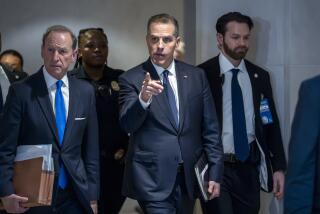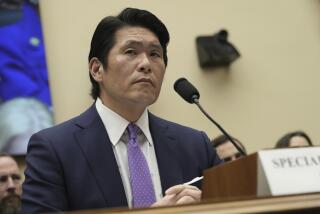Clinton Aide Refuses to Testify About ’93 Meeting With Lawyer
- Share via
WASHINGTON — Presidential adviser Bruce Lindsey set up a possible clash between the White House and the Senate Whitewater Committee by refusing to testify Tuesday about a meeting with President and Mrs. Clinton’s Whitewater lawyer.
Defending his extensive gathering of information on the Whitewater affair in September and October, 1993, Lindsey testified that he met with the Clintons’ private attorney, David E. Kendall, on Nov. 5, 1993, to discuss a legal defense of the President and First Lady.
Lindsey said he thought the discussions in Kendall’s office were shrouded by attorney-client privilege, a protection the Clintons may invoke to keep their lawyer’s conversations secret.
But committee Chairman Alfonse M. D’Amato (R-N.Y.) asked whether the privilege applies to a meeting attended by three White House aides: Lindsey, then-White House Counsel Bernard Nussbaum and then-Associate Counsel William Kennedy.
D’Amato said the attorneys for the committee’s Republican majority and Democratic minority, Michael Chertoff and Richard Ben-Veniste, will try to resolve the matter.
“The purpose of the meeting was Whitewater Development Corp.,” said Lindsey, who declined to elaborate.
Kennedy told Senate investigators earlier this month that the meeting included a discussion of Arkansas Municipal Judge David Hale. Hale was the focus of a Whitewater-related criminal investigation and one of the people Lindsey, Kennedy and Nussbaum were collecting information about in 1993. Hale says Clinton pressured him to make an improper $300,000 Small Business Administration-backed loan to the Clintons’ Whitewater partners.
“The White House has a memo” about the Nov. 5, 1993, meeting, and “it’s an area of contention” because the White House is refusing to give it to the Senate, D’Amato disclosed at the hearing.
More to Read
Get the L.A. Times Politics newsletter
Deeply reported insights into legislation, politics and policy from Sacramento, Washington and beyond. In your inbox twice per week.
You may occasionally receive promotional content from the Los Angeles Times.








